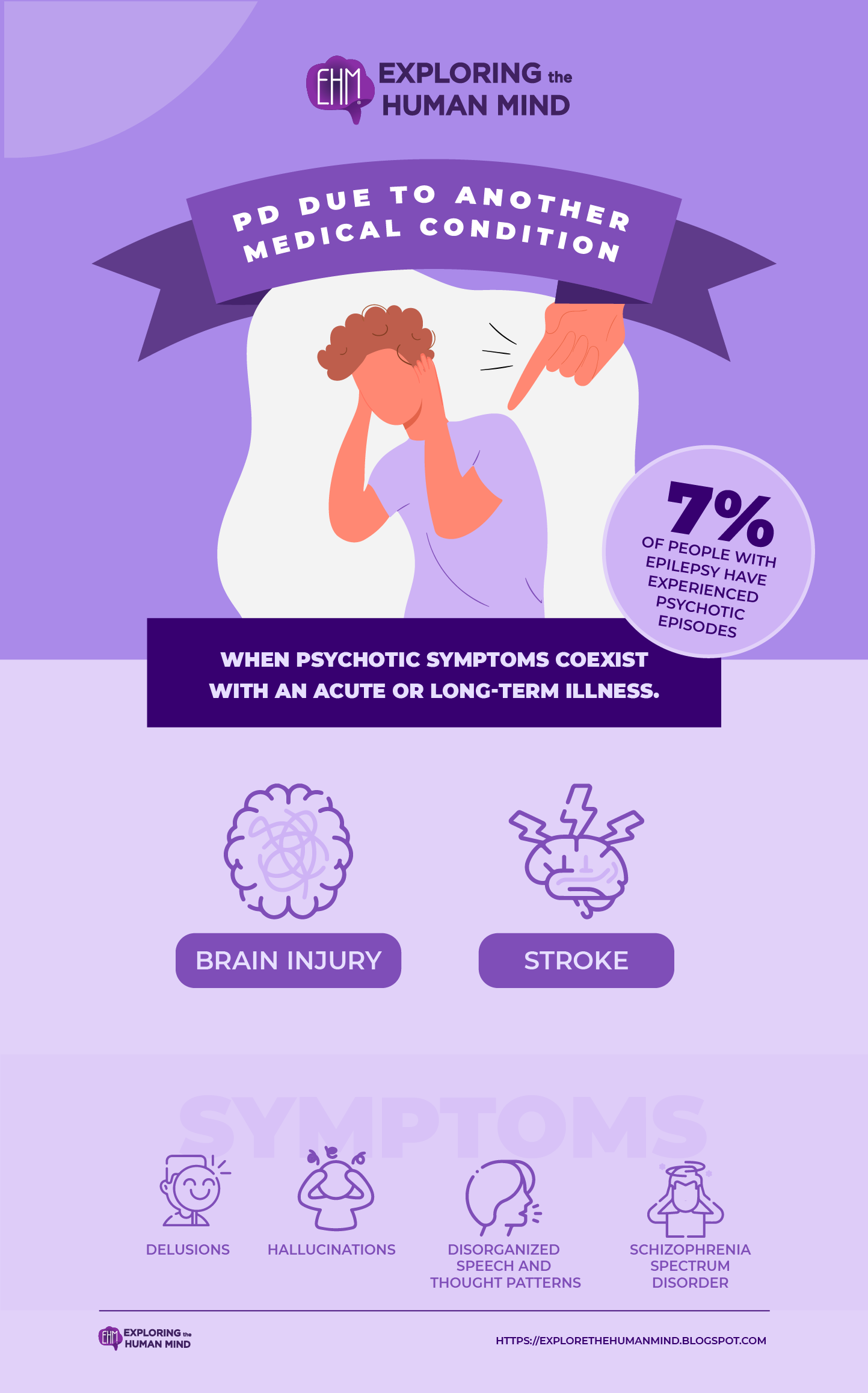Psychotic Disorder Caused by Another Medical Condition
Depending on the changes to the brain brought on by the primary illness, psychotic disorders brought on by other medical conditions can have a variety of causes. Brain tumours, head injuries, autoimmune diseases, thyroid issues, epilepsy, and infections of the central nervous system are some of these conditions.
When symptoms are brought on by drug use or withdrawal, the DSM-5 labels this condition as substance-induced psychotic disorder, so it is not diagnosed. If psychosis only manifests as delirium, the diagnosis is also withheld.
According to the DSM-5, symptoms of psychotic disorder due to another medical condition include:
- Hallucinations (hearing or seeing things that don't exist)
- Delusions
- Disorganized speech and thought patterns
- Symptoms of a medical condition not associated with mental disorders that may cause psychosis, such as schizophrenia spectrum disorder
According to one study from 2006, the development of this disorder may also be influenced by the nature of the relationship between the people affected. Shared psychotic disorder is most common in married couples, but it is also common in close siblings.

vectors by Freepick; graphic design by Vadot
Symptoms can be temporary and brief, or they can be long-term and persist long after the underlying medical condition has been resolved.
Psychotic disorder caused by another medical condition develops as a result of changes in brain function caused by the primary medical condition. Brain tumours, traumatic brain injury, epilepsy, autoimmune disorders, thyroid disease, Huntington's disease, central nervous system infections, cerebrovascular disease, auditory or visual nerve damage, multiple sclerosis, stroke, or a migraine headache are all examples of this condition.
Approximately 7%of people with epilepsy have experienced psychotic episodes. This type of psychosis may occur as a single incident or may come and go, depending on the course of the medical condition.
Treatment
Treatment for these types of psychotic episodes is based on treatment for the triggering condition. Often, treating the primary medical condition results in a remission of psychotic symptoms, but psychosis can persist long after the medical issue has been resolved, necessitating additional treatment if residual symptoms interfere with daily activities and social relationships.
Antipsychotic medications may be prescribed to help control delusions and hallucinations and to keep symptoms from recurring.
Psychosis caused by other medical conditions is treated by first addressing the primary problem, which is the triggering illness. In general, once the other condition is treated, the symptoms of psychosis will go into remission. However, psychosis can persist long after the other condition has been treated and necessitates additional treatment.
Reference:
Psychotic Disorder Due to another Medical Condition - Qube. (2019). Qube. https://www.casarecovery.com/psychotic-disorder-due-to-another-medical-condition/#:~:text=Psychotic%20disorder%20due%20to%20another%20medical%20condition%20has%20several%20causes,and%20central%20nervous%20system%20infections.
Tamminga, C. (2022, April 4). Psychotic Disorder Due to Another Medical Condition. MSD Manual Professional Edition; MSD Manuals. https://www.msdmanuals.com/professional/psychiatric-disorders/schizophrenia-and-related-disorders/psychotic-disorder-due-to-another-medical-condition
Psychotic Disorder Due to Another Medical Condition. (2017). Psychology Today. https://www.psychologytoday.com/us/conditions/psychotic-disorder-due-another-medical-condition






Comments
Post a Comment